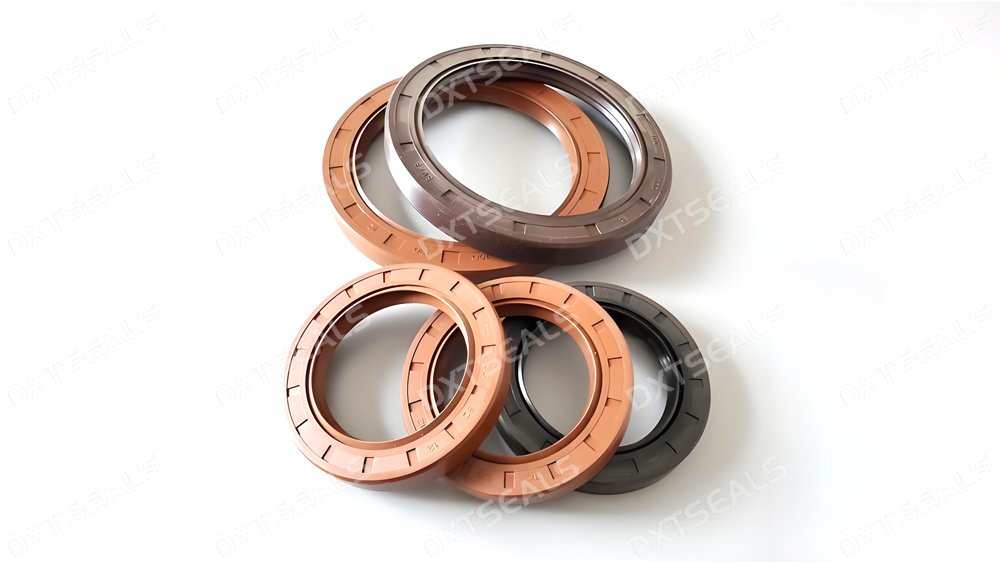
Sealing components play a vital role in industrial equipment and mechanical systems. Whether it’s containing fluids, excluding contaminants, or controlling pressure, seals ensure reliability and efficiency in harsh environments.
In this article, DXTSEALS explores the diverse applications of sealing solutions across major industries and provides essential selection criteria for choosing the right type of seal.
🔧 Common Industrial Applications of Seals
1. Automotive Industry
Seals are used in engines, transmissions, brakes, and fuel systems to prevent leaks and protect components.
-
Oil seals prevent lubricant leaks in rotating shafts.
-
O-rings are used in hydraulic and pneumatic systems.
-
Axle and wheel seals resist dirt, water, and vibration.
2. Aerospace
Seals in aircraft face extreme temperatures and pressures.
-
High-performance fluorocarbon or PTFE seals ensure reliability in hydraulic, fuel, and environmental systems.
-
Lightweight, precision seals are critical for safety and weight control.
3. Oil & Gas
Operations demand seals that withstand high pressures, corrosive fluids, and high temperatures.
-
Metallic and elastomeric seals are used in pipelines, compressors, and drilling tools.
-
Seals must comply with API and ISO standards.
4. Chemical Processing
Chemical plants require seals resistant to aggressive media.
-
PTFE, FKM, and EPDM materials are commonly used.
-
Seals protect pumps, valves, and reactors from leaks and contamination.
5. Food & Beverage
Hygienic sealing is crucial for safety and regulatory compliance.
-
FDA-compliant rubber seals (e.g., silicone, EPDM) are used in mixers, dispensers, and filling machines.
-
Seals must tolerate CIP (clean-in-place) and SIP (sterilize-in-place) processes.
6. Renewable Energy
Seals are essential in wind turbines, solar tracking systems, and hydropower equipment.
-
High-durability shaft seals protect against moisture, dust, and temperature variation.
-
Long service life is critical to minimize maintenance in remote locations.
✅ Key Selection Guidelines for Sealing Components
Choosing the right seal involves multiple engineering factors. Here’s what you should evaluate:
1. Operating Environment
-
Temperature range
-
Pressure conditions (static or dynamic)
-
Exposure to chemicals, UV, water, or dust
2. Application Type
-
Static vs. dynamic sealing
-
Linear or rotary motion
-
Sealing fluid type (oil, water, gas)
3. Material Compatibility
-
Match seal material to system fluid and temperature
-
Common materials: NBR, FKM, PTFE, EPDM, PU
4. Seal Geometry and Design
-
Lip seals, O-rings, V-rings, PTFE spring-energized seals, etc.
-
Consider wear resistance, friction, and sealing tightness
5. Compliance and Standards
-
For medical or food applications: FDA, USP Class VI
-
For oil & gas or aerospace: API, ISO, AS9100
🏆 Why Choose DXTSEALS?
At DXTSEALS, we specialize in custom sealing solutions tailored to the specific needs of each industry. Our products are manufactured with advanced materials and precision processes to ensure performance under extreme conditions.
We offer:
-
Customized seal design
-
Material selection support
-
Rapid prototyping and testing
-
Industry-standard certification
📌 Conclusion
From aerospace to food processing, sealing solutions are foundational to equipment reliability and safety. By understanding your application needs and selecting the right seal design and material, you can significantly reduce downtime, leakage, and operational risk.
Trust DXTSEALS to deliver durable, high-performance seals that meet the highest industrial standards.
👉 Learn more or request a quote at www.dxtseals.com
